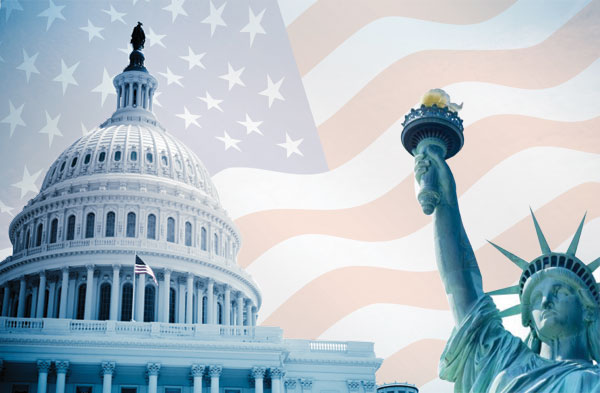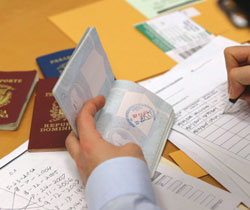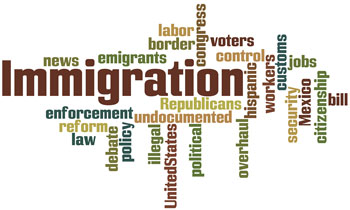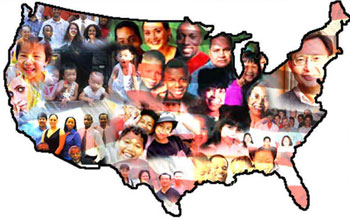Immigration Reform

A comprehensive immigration reform bill – the Border Security, Economic Opportunity and Immigration Modernization Act – was introduced in the Senate on April 16, 2013. While far from being perfect, the bill makes huge strides toward creating a more workable immigration system by addressing numerous issues, outlined below.
 BORDER SECURITY
BORDER SECURITY
The appropriation of $3 billion to acquire surveillance and detection capabilities, additional Border Patrol agents and Customs and Border Protection officers at and between ports of entry along the Southern border as well as Customs agents nationwide; unmanned aerial systems and fixed-wing aircraft and the required staff and equipment. It establishes a strategy to identify where security measures such as fencing, infrastructure and technology should be deployed along the Southern Border.
It will implement the utilization of an electronic exit system at air and sea ports of entry by collecting machine-readable visa or passport information.
LEGALIZATION
 A new Immigrant status known as “Registered Provisional Immigrant Status” (RPI) would be created for those in unlawful status so that they can adjust their status from unlawful to legal. Eligible if:
A new Immigrant status known as “Registered Provisional Immigrant Status” (RPI) would be created for those in unlawful status so that they can adjust their status from unlawful to legal. Eligible if:
- Residence in the U.S. before December 31, 2011 and continuing physical presence since then
- Paid a $500 penalty fee (except for DREAM Act eligible students), and assessed taxes, per adult applicant in addition to all other applicable fees
Ineligible if:
- Convicted of an aggravated felony
- Convicted of a felony
- Convicted of 3 or more misdemeanors
- Convicted under foreign law of an offense
- Voted unlawfully
- Found to be inadmissible for criminal, National Security, Public Health, or morality grounds
 RPI STATUS
RPI STATUS
- Application period will be for 1 year with possible extension for another year
- RPI status will last for 6 years and renewable if the immigrant does not commit any acts resulting in deportation. Another $500 penalty fee is applicable at renewal
- Spouses and children of those in RPI status can be petitioned for as derivatives but they must be in the U.S. at the time
- Allows employment with any employer and travel outside the U.S.
- Individuals outside the U.S. previously here before December 31, 2011 and deported due to non-criminal reasons can apply to re-enter in RPI status if they are the spouse of or parent of a child who is a U.S. citizen or lawful permanent; or a childhood arrival eligible for the DREAM Act
- Individuals with removal orders will be permitted to apply as will individuals currently in removal proceedings
- Ineligible for any Federal means-tested public benefits if in RPI status
After 10 years in RPI status, one may adjust to Lawful Permanent Resident status through the same system everyone else must use to earn a green card if the following have occurred:
- Maintained continuous physical presence
- Paid all taxes owed during RPI status period
- Worked in the United States regularly
- Demonstrated Civics and English knowledge
- All people currently waiting for family and employment green cards as of the date of enactment have had their priority date become current
- Paid a $1000 penalty fee
The bill would enable those in DREAM Act status and the Agricultural Program to obtain their green cards in 5 years and DREAM Act kids will be eligible for citizenship immediately after getting their green cards.
 LEGAL IMMIGRATION
LEGAL IMMIGRATION
The bill eliminates the backlog for family and employment-based immigration.
Family Based Immigration– The bill:
- Proposes two family preference categories as opposed to the current four preference categories. The two proposed categories will cover unmarried adult children; married adult children who file before age 31 and unmarried adult children of lawful permanent residents
- Amends existing category for married sons and daughters of U.S. citizens to include only sons and daughters who are under 31 years
- Expands the V visa to allow those with an approved family petition to live in the U.S. and allows certain other family members to visit the U.S. for up to 60 days a year
- Eliminates the family fourth preference category – availability of visas for siblings of U.S. citizens- once 18 months have elapsed from date of enactment
- Amends the definition of “immediate relative” to include a child or spouse of an alien admitted for lawful permanent residence The bill would repeal the Diversity Visa Program but would allow those selected for fiscal years 2013 and 2014 to receive the immigrant visas.
 Employment Based Immigration – The bill:
Employment Based Immigration – The bill:
- Exempts the following from the annual numerical limits on employment based immigration: derivative beneficiaries of employment-based immigrants; aliens of extraordinary ability in the sciences, arts, education, business or athletics; outstanding professors and researchers; multinational executives and managers; doctoral degree holders in any field; and certain physicians
- Allocates 40 percent of the worldwide level of employment-based visas to: members of the professions holding advanced degrees/their equivalent whose services are sought in the sciences, arts, professions, or business by a U.S. employer and aliens with a Master’s degree or higher in science, technology, engineering or mathematics from an accredited U.S. institution of higher education and have an employment offer in a related field and the qualifying degree was earned in the five years immediately preceding the filing of the petition
- Increases the percentage of employment visas for skilled workers, professionals and other professionals to 40 percent
- Creates a startup visa for foreign entrepreneurs who seek to emigrate to the U.S. to startup their own companies
- Merit Based Visa – created in the fifth year after bill’s enactment will award points to individuals based on their education, employment, length of residence in the U.S. and other considerations. Those with the most points get the visas. 120,000 merit based will be available per year
EMPLOYMENT VERIFICATION
- Mandatory employment verification required over a 5 year phase in period
- Photo matching – requires every non-citizen to show their biometric work authorization or biometric green card
- System allowing employees to “lock” their Social Security number in the E-verify system so that their number cannot be used by another individual
- System to investigate whether Social Security numbers are being improperly used multiple times
TEMPORARY VISAS
H-1B Reform
- Increases cap from 65,000 to 110,000; cap can go as high as 180,000 in future years
- Amends the current 20,000 exemption for U.S. advanced degree holders to 25,000 exemption for advanced degree students in science, technology, engineering and math
- Requires employers to pay significantly higher wages for H-1B employees and to first advertise the jobs to American workers at this higher wage before hiring an H-1B
- Provides work authorization to H-4s if the
H-1B’s country provides reciprocal treatment to spouses of U.S. workers
- 60-day transition period for H-1B workers to change jobs
- Crack down on H-1B abusers by requiring payment of significantly higher wages and
fees than normal users as follows:
- If the employer has 50 or more employees and more than 30% but less than 50% are in H-1B or L-1 status and do not have a green card petition pending, the employer must pay a $5000 fee per additional worker in either of these two statuses
- If the employer has 50 or more employees and more than 50% are H-1B or L-1 and do not have a green card pending, the employer must pay a $10,000 fee per additional worker in either of these two statuses
- In Fiscal Year 2014, companies will be banned from bringing in any additional workers if more than 76% of their workers are H-1B or L-1
- In FY 2015, the ban applies to companies if more than 65% of employees are in H-1B or L-1; in FY 2016, the ban applies to 50%
- Requires recruitment and posting a detailed job opening on the Department of Labor’s website for at least 30 days prior to hiring an H-1B
 W-Visa for Lower Skilled Workers in Eligible Occupations
W-Visa for Lower Skilled Workers in Eligible Occupations
- The W visa holder is an alien having a foreign residence coming to the U.S. to perform services/labor for a registered employer in a registered position
- Spouse and minor children can accompany or follow to join and will be given work authorization for the same period as the W
- The W non immigrant will apply at a U.S. embassy or Consulate to be a certified alien.
- Eligibility criteria: cannot be found to be inadmissible, pass a criminal background check, agree to accept only registered positions in the U.S. and meet any other established requirements
- Valid for an initial period of three years and renewable for additional three year periods
- W non immigrant may not be unemployed for more than 60 consecutive days and must depart the U.S. if unable to find employment
- Cap of 20,000 for the first year; 35,000 in the second; 55,000 in the third and 75,000 in the fourth. After the fourth year, the cap will be calculated as per a statistical formula.
AGRICULTURAL JOB OPPORTUNITY, BENEFITS AND SECURITY ACT
Current undocumented farm workers who have been employed in the U.S. will be eligible for an Agricultural Card. Those who fulfill future Agricultural Card work requirements in U.S. agriculture, paid all taxes, not been convicted of any serious crime, and paid a $400 fine are eligible to adjust to legal permanent resident status.
The current H-2A program would be replaced by a W-3 visa and a W-2 visa.
 About the Author
About the Author
Manju Kalidindi is a practicing Immigration Attorney in Plantation, FL. She has been recognized by the Supreme Court of Florida for exceptional pro bono service; and was the Broward Lawyers Care Attorney of The Month in November 2012. Miss Kalidindi is the current President of SAHARA, a South Florida based non-profit organization that assists victims of Domestic Violence .























